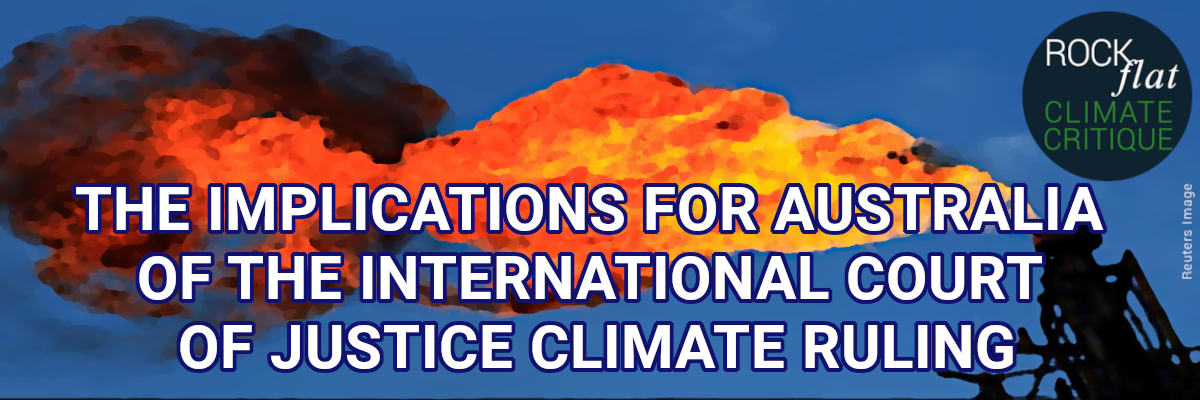AUSTRALIA’S VULNERABLE CLIMATE POSITION WRIT LARGE BY THE ICJ
Date Published 30 July 2025
Author: Robert Watson
Reading Time: 9 minutes
On 23rd July 2025, the International Court of Justice (The Court)Ap-1 in it’s first ever decision on a climate case delivered an Advisory Opinion on the obligations of States to protect the climate system (from greenhouse gas emissions).
The groundwork leading to The Court decision started when a group of Pacific Island law students sought ways to save Vanuatu from the effects of climate change in 2019. From a tiny country often paddling in water from tidal and storm inundation to the The Court in The Hague is a long journey, and a clear moral victory for mostly poorer nations. Whether it will also facilitate a legal victory remains to be seen.
The Court found that States have a legal obligation to limit global warming to 1.5°C, marking a landmark moment in international environmental law and climate justice.1
This historic ruling by the The Court upholds the obligations of countries to cut pollution of the climate, and prevent significant harm to the global climate that sustains human life. The ruling has set out the legal consequences for breaches of the obligations. The Court “considers the 1.5°C threshold to be the parties’ agreed primary temperature goal for limiting the global average temperature increase under the Paris Agreement.” In other words, the Court makes it clear that to be aligned with Paris obligations a country should be acting to hold warming to 1.5°C2. The Court is also clear that a country is responsible for the climate pollution of the private sector under its jurisdiction.
The implications for Australia are possibly greater than for most other countries. The reasons for this are Australia’s continued reliance on fossil fuel mining and exports, even under a Labor government, as well as the many years of climate inaction and opposition by consecutive conservative Liberal-National Party governments that were, and are still, as the opposition in parliament, obsequious to the fossil fuel industry.
To balance the scales a should be noted that despite climate protection and climate change alleviation assurances given by a new incoming Labor government in 2022, the positive climate measures that have been undertaken since 2022 have been more than countered by the number of fossil fuel mining permits and extensions to existing permits given by the Albanese government. Compared to the emissions that will emanate from at least 27 new fossil fuel projects, the savings in emissions made by some token emission reduction programs onshore in Australia are minutiae – almost insignificant. Just one new project, Woodside’s North West Shelf gas extension will release 4.4 billion tonnes of greenhouse gas into our air over the life of the project. Little wonder many Vanuatuans and other Melanesian populations living on low elevation Pacific Islands are concerned.
The recently approved North West Shelf gas project extension is a quintessential example of how Australia’s immense natural wealth has been under-valued and mismanaged by both major Australian political parties in government. It is almost unbelievable, in what has been called “the great gas giveaway”3 by The Australia Institute, that over the 50 year period of the NW Shelf gas extension, an estimated $215 billion value in gas, over 50%, will leave Australia royalty free. This extraordinary situation seems to have come about because of government appeasement of the fossil fuel companies over the years. Intense lobbying tied to generous financial donations by the miners “convinced” various governments that imposing higher royalties, or any royalties in some cases would discourage miners from investing in Australia. The fact that policy makers actually fell for this argument makes them either gullible, greedy or just plain stupid. Unfortunately, the NW Shelf project is only one of most gas development and exploitation projects paying little or no royalties. The Petroleum Resource Rent Tax brought in in 1988 was designed to ensure Australians benefited from oil and gas exploitation by making a “rent” tax that is basically a tax on super profits. The PRRT was touted by governments on both sides as a surety that Australians would reap the benefits of their own natural resources. So far, the revenue collected by the Commonwealth in HECS fees exceeds the revenue of PRRT collection! This ridiculous situation is the result of smart mining company lobbying and accounting against governments acquiescence to power and straight out incompetence. (If you would like more information on Australia’s labyrinthine royalty, tax and sovereign wealth situation read the essay AUSTRALIA’S DISAPPEARING SOVEREIGN WEALTH on the Rockflat website.)
Australia was one of several high-emitting countries that argued against wholesale changes to agreements reached since the Paris Agreement. Not only is Australia (one of) the highest emitting countries per capita in the world, but also the Australian government has always argued that Australia is responsible for onshore emissions only, not the millions of tonnes of emissions produced by coal and gas exported from Australia. Thankfully, for the benefit of the whole world The Court vetoed Australia’s parochial view by ruling that fossil fuel export industries constitute “significant harm to the climate system”. The Court also rejected arguments put forward by high-emitting nations, including Australia, USA and China, that it was impossible to attribute greenhouse gas emissions to individual countries. The judges found that fossil fuel production and consumption, the granting of fossil fuel exploration licences, and fossil fuel subsidies may constitute internationally wrongful acts. As Australia is one of the world’s largest fossil fuel exporters, if the emissions of Australia’s fossil fuel exports were added to the already unhealthy domestic emission levels the numbers would be enormous. The totality of Australia’s relative share of greenhouse gas emissions in the world is very significant – the harm to the World atmosphere by Australia on a per capita basis is enormous.
Another disturbing issue is continual postponement of a pre-2022 election promise by Albanese to establish an Environmental Protection Authority (EPA) as a robust body with the power and independence to protect all aspects of the environment. Not only did Albanese fail to legislate an EPA in the first term of government, but the new, apparently “watered down” EPA model now proposed to be brought down in this term will lack the independence and power that is desperately needed in Australia.4, 5
Where Australian voters and a broad section of the Australian community have not been able to force the government to invest more effort and time into combating climate change, perhaps the actions of one of Australia’s smallest and most vulnerable Pacific neighbours in taking their case to the “World” Court will succeed, if only because the consequences of not acting will be electorally devastating for Labor, not to mention the destructive power of continuing climate change for Australia and her neighbours.
Should Australia not heed the many messages coming from the International Court of Justice, many of our trading partners – already well invested in non-fossil fuel economies, and neighbours on low-lying islands, and others, we risk gaining the reputation as a climate pariah, and we will be poorer – in every way.

The Pacific Island students who instigated the ICJ hearings
Ap-1. From ICJ website:
The International Court of Justice (ICJ) is the principal judicial organ of the United Nations (UN). It was established in June 1945 by the Charter of the United Nations and began work in April 1946.
The Court is composed of 15 judges, who are elected for terms of office of nine years by the United Nations General Assembly and the Security Council. It is assisted by a Registry, its administrative organ. Its official languages are English and French.
The International Court of Justice has a role to settle, in accordance with international law, legal disputes submitted to it by States and to give advisory opinions on legal questions referred to it by authorised United Nations organs and specialised agencies.
1. ©IUCN, International Union for Conservation of Nature and Natural Resources | https://iucn.org/
2. The Climate Council | https://www.climatecouncil.org.au/implications-of-the-international-court-of-justice-decision-for-australia/
3. The Australia Institute | https://australiainstitute.org.au/post/great-gas-giveaway-215-billion-in-royalty-free-gas-for-woodsides-north-west-shelf-project/
4. Biodiversity Council | Australia needs a strong independent environmental regulator
5. Ken Henry – Former Treasury Boss | If Albanese can’t pass this test, ‘we should stop dreaming’ | SMH July 16 2025, Mike Foley


